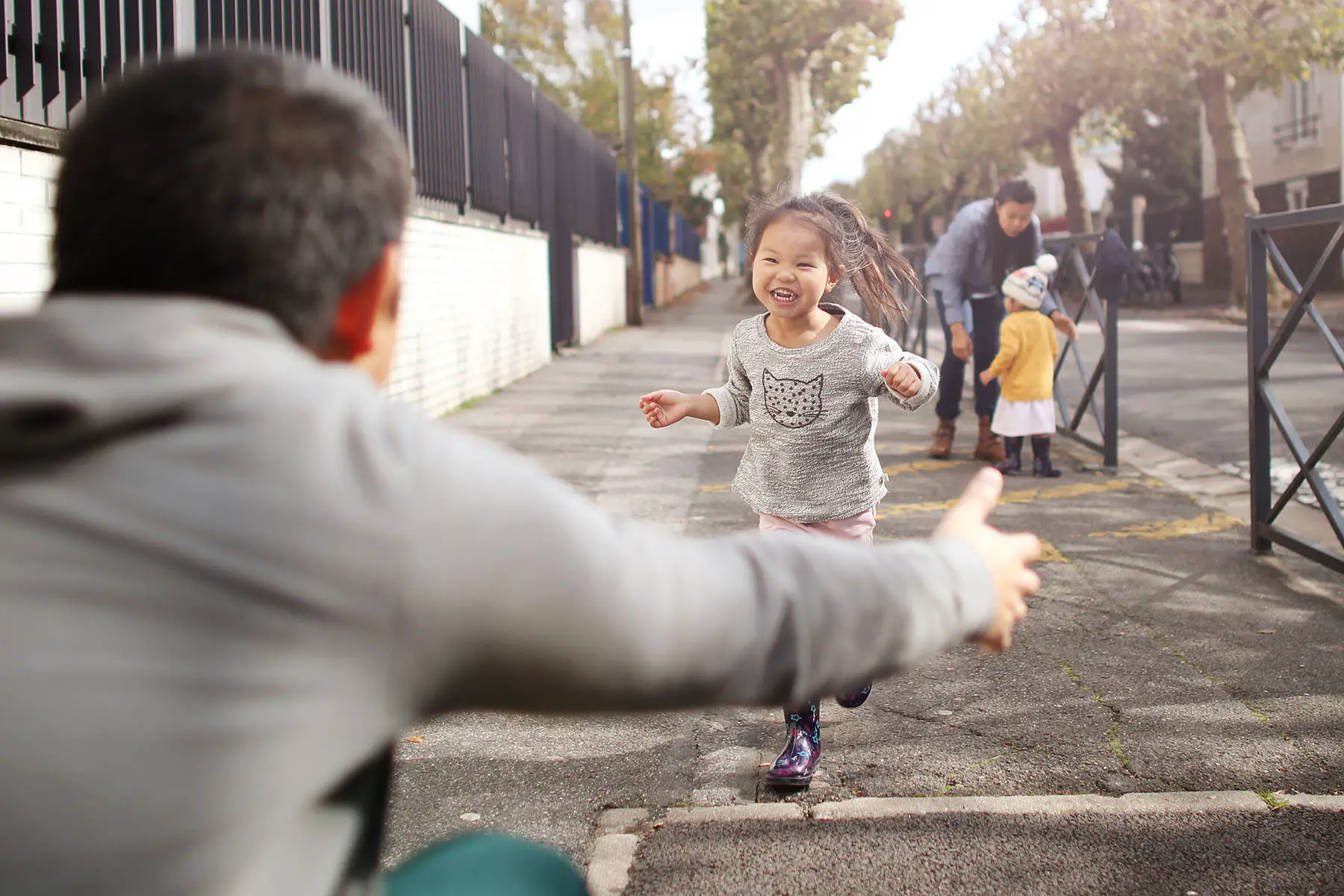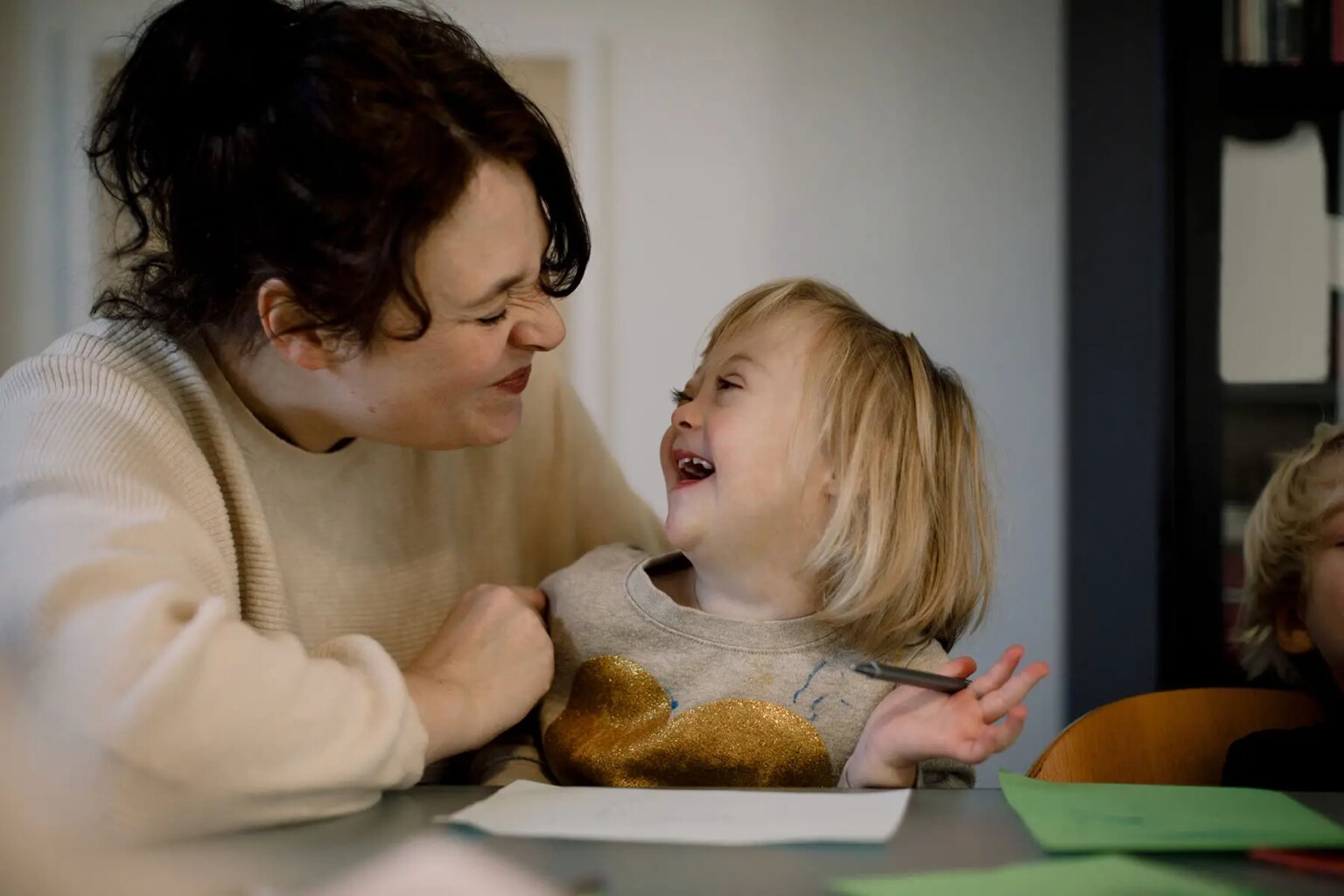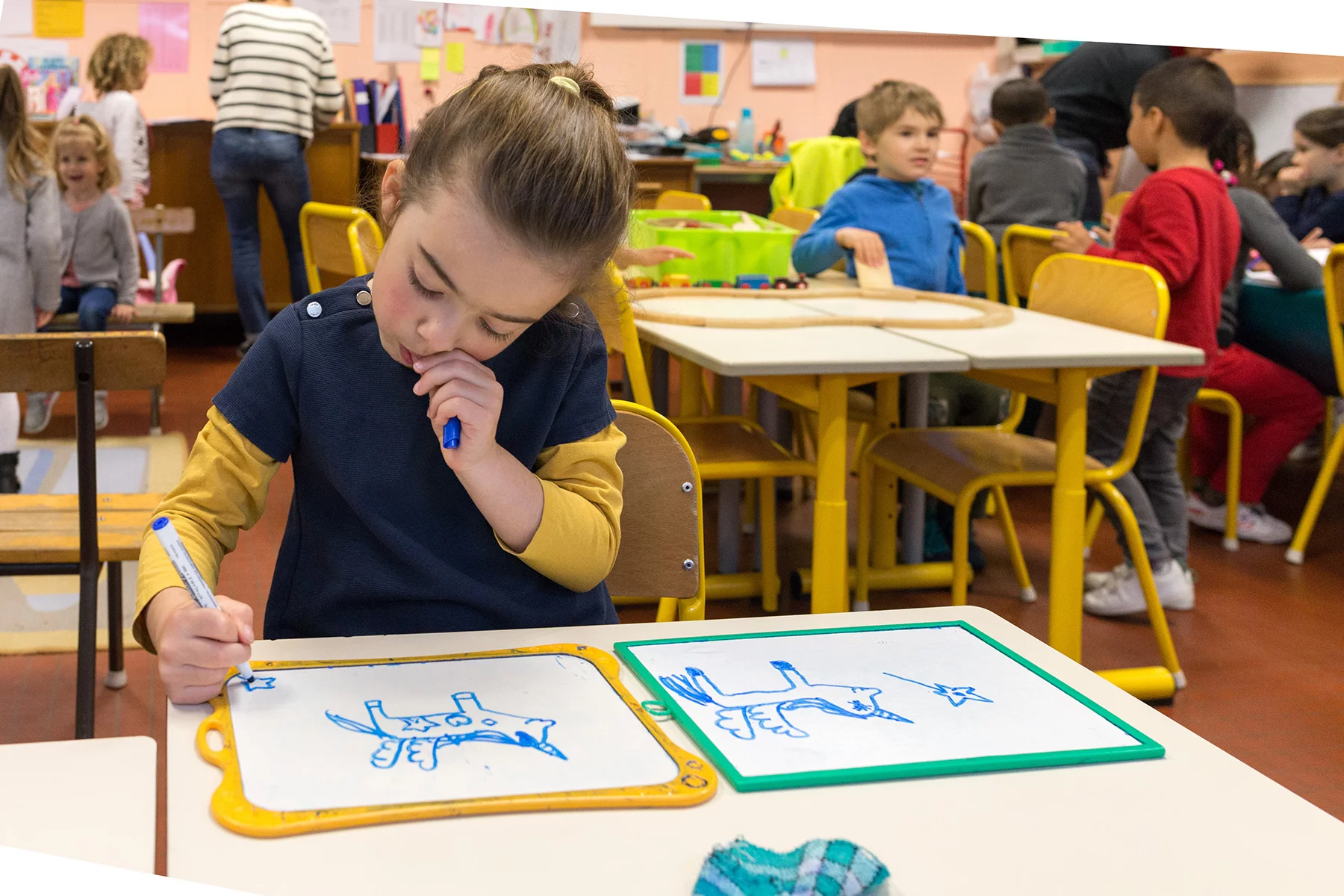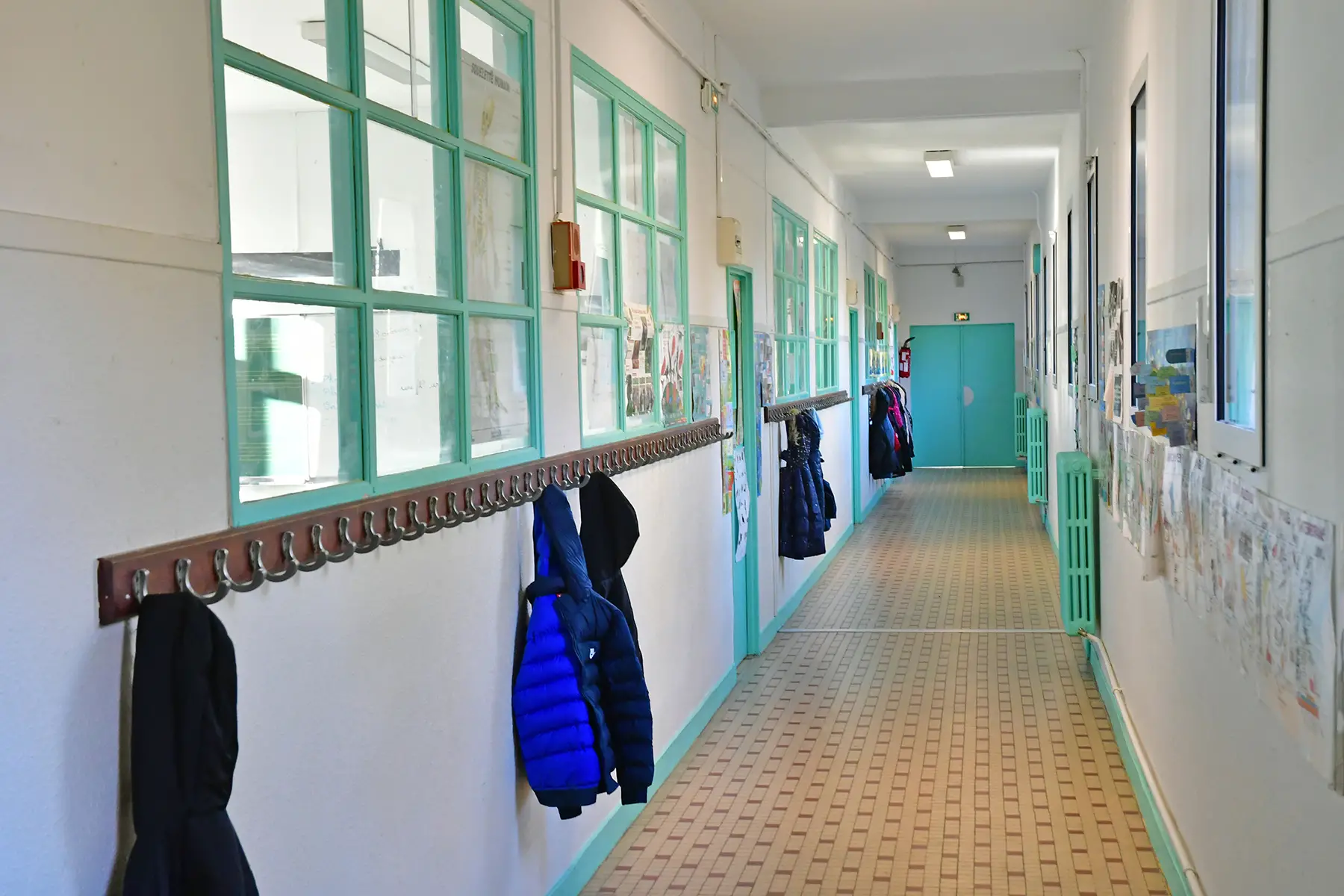Whether you’ve moved to France with your toddler or you just had a baby, at some point you’ll need to enroll them at daycare or preschool. While daycares are optional, preschools are compulsory for all children aged 3 to 6. Both are in high demand and require you to apply far in advance.
Let’s dive in:
Childcare in France
Before primary school (école éléméntaire), children in France can go through two cycles of childcare. From the age of 0–3, they can go to an optional daycare nursery (crèche). After that, they must go to mandatory preschool (école maternelle) until the age of six.

Daycare nurseries can be associative, parent-run, public, or private, and offer a generally high level of care. Almost all use a means-tested fee system, meaning the more you earn, the more you pay.
Places at nurseries are usually hard to come by, as anyone pregnant or with a child can sign up. The only requirement is that your child is fully vaccinated when they join.
Once your child turns 3, they must go to preschool. These can be public (free) or private (fee-based). In public school, you only need to cover the costs of the extra services that your child is signed up for (e.g., meals and after-school care).
Types of early childcare in France
The optional French daycare for children aged 0-3 can be one (or a mix) of three choices:
- A local nursery
- A qualified childminder (assistante maternelle or nounou) who looks after a few children in their home
- A nanny or au-pair who looks after your child in your home
When choosing the right childcare option for you, you’ll need to factor in things like your work schedule, your preferred rearing method, and what is available in your area.
Local nurseries in France
There are various sizes and types of nurseries, from the micro-crèche that hosts a maximum of nine children, to large crèches collectives that host up to 60 children. In most areas, the offer is smaller than the demand, so it’s good to register your child before they are born.
For public nurseries, you can sign up through your local town hall (mairie). They will select a local school based on your address. If you don’t like the school that’s been assigned, you can also choose to enroll your child in a private or associative nursery. This likely means regularly sending email requests with your information.
To register your child for a public or private daycare nursery, you’ll need to provide:
- Your child’s birth certificate (extrait de l’acte de naissance)
- Your child’s medical records and proof of vaccination (carnet de santé)
- Your tax or salary information
Parental income and family size determine fees in public and associative nurseries. The lowest-earning families may pay as little as €50/month for a full-time place in a nursery. But a family earning around €4,000/month will pay around €400.
Advantages of nurseries
Nurseries are open for most of the year, have flexible schedules, and employ many well-trained professionals to look after your child. Often, well-balanced meals and snacks are served with the guidance of a nutritionist.

Children will learn to socialize early and have access to a great variety of toys and activities. The school often organizes outings or things like musical activities.
Childminders in France
Childminders are certified professionals with at least 120 hours of training. You can find one local to you through websites like:
It’s a good idea to test out a few different childminders before you employ one. During this trial time, you check out their homes and discuss things like contract hours, meals, child activities, and fees.
The baseline salary for an assistante maternelle cannot be below €3.49/hour (2023). If they have to work beyond the standard 45 hours per week, the contract needs to state the rate of overtime. This must be at least 10% above the baseline rate.
The contract can also include an additional allowance to cover the costs of things like materials (e.g., toys, nappies, linens), heating, and electricity. The French government has created an online calculator to help you work out these additional charges.
Advantages of childminders
Some parents prefer to have a single person look after their child in a home setting. Compared to a nursery, childminders will be more flexible in terms of your child’s daily schedule or dietary regime. Keep in mind, however, that they will have a less flexible work contract, and during vacation days or sick leave, you might find yourself with no backup childcare options.
Childminders will often take children out to the local park, where they meet other childminders and children. They might also organize outings, along with other creative and developmental activities.
Nannies and au-pairs in France
Live-at-home nannies or au-pairs are rare. Unlike the assistante maternelle, the nanny or au-pair does not need to have any specific qualifications. However, you will want good references and may want to check their ID and work permit with the local police (prefecture).
The Urssaf Pajemploi service can help you find a suitable nanny and take care of a contract, monthly payslips, and administrative declarations. You can also decide to hire through an agency that specializes in international or bilingual childminders. Agencies include:
Other early childcare options in France
If you don’t need full-time early childcare, you can send your child to a public or private kindergarten (jardin d’enfant) or part-time daycare (halte-garderie).

French kindergartens often have an education program to help children integrate into preschool. They may have more restricted opening times than nurseries during the week, but can be open during vacation days.
The halte-garderie are part-time drop-in centers, run by qualified staff. They can legally host a maximum of 60 children but are usually much smaller.
You can use the Monenfant.fr website to find one near you, and they will be listed under ‘crèches’.
Preschool in France
It is mandatory for a child over the age of three to go to preschool. Although some schools accept children as young as two in a très petite section (TPS) class, most kids will attend the maternelle for three years before moving on to a primary school (école élémentaire). These years are known as:
- Petite Section (PS) – age 3-4
- Moyenne Section (MS) – age 4-5
- Grande Section (GS) – age 5-6
Some schools mix these levels, so children can socialize with all age levels.
French legislation no longer allows homeschooling, except in some very specific cases including severe disability. French public schools need to integrate children with mild physical or learning disabilities.
What is an école maternelle?
The école maternelle is the first cycle of the school system in France. Since it is mandatory, a place at a free public preschool will always be available. However, you can also enroll your child at a private alternative.
French preschools have 24 hours of class per week. This can be organized in different ways depending on the school. A typical example is having two hours of class in the morning and two to three hours in the afternoon, with a long break for lunchtime. Wednesday afternoons are usually free.
Classes generally consist of 25 children or more, a teacher, and a teaching assistant. Additional staff (e.g., psychologists or activity leaders) are less of a regular presence.
What do children do at preschool?
The école maternelle is a transition phase between daycare and primary school, with an emphasis on play and socialization. Children still have nap times and can go home for lunch rather than eat at the school canteen. However, they also start learning to read and write, and have organized lessons and tasks to complete. Physical play and activities are also an important part of their daily schedule.
The teacher typically follows each child’s progress through the use of notebooks that the children fill in and take home to show parents. The main aim is to introduce children to a school environment. As such, teaching is typically organized into five key areas:
- Language and expression
- Physical activities
- Artistic activities
- Structuring thought
- Exploring the world
Meals are also provided following nutritional guidelines, with local, healthy, and varied ingredients. If parents want, they can also drop off children for breakfast at school. At noon, children eat with others in the canteen or are picked up by parents and eat lunch at home.

There is a morning snack and sometimes an afternoon snack if children stay in after-school care. Snacks are varied, including fruit, milk, biscuits, and chocolate. Parents must sometimes provide snacks for the class one day a month.
Finding and choosing a preschool in France
If you plan to enroll your child in a local public school, you won’t have much saying in the school they go to. Although it is possible to state a preference for a particular school, your child will be assigned a school based on your address.
There is little information online about the quality of different public schools, so it’s best to try speaking to other parents to get local information. It’s worth bearing in mind that, though the standard of French preschools is generally high, some differences so exist. For instance, schools in poorer areas may have additional funding for extra activities, such as outings, swimming lessons, rollerblading, and the like.
Private schools may have better facilities than state schools, but their class sizes won’t necessarily be smaller. They tend to follow the same curriculum as public schools, and often have a non-standard teaching philosophy. For example:
- Religious (mostly Catholic)
- Montessori
- Steiner-Waldorf
- Écoles écocitoyennes (with a focus on environmental learning)
- Écoles démocratiques (which are pupil-led with no set curriculum)
How to enroll your child in a preschool
If you want to send your child to a public preschool, you can contact your local town hall. You must do so by June for the school year starting in September. You’ll need to provide:
- Passport or ID
- If not a French national, your residence card (cartes de séjour)
- Your child’s birth certificate or a livret de famille (your family record)
- Your child’s medical record and proof of vaccination
- Proof of address (e.g., a utility bill)
- Proof of health insurance
If not in French, foreign documents might need to be translated by an official translator. You’ll then be given a certificate of enrollment (certificat d’inscription).
If you prefer to enroll your child in a private school, you can contact the preschool directly and book an appointment. You will likely have to provide the same documents.
Costs of a French preschools
Public schools are free. Parents just have to cover the costs of meals and pre- or after-school care. A lunch might cost around €3/day and after-school care with a snack €5/day. You might also be asked to contribute financially to school outings, although these are generally well-subsidized.

The costs of private schools vary. For instance, while most Montessori preschools charge between €190 and €350 per month and per child, some schools in Paris will have prices well over €500. School fees do not include meals.
Prices at private schools can often be reduced if two or more children are enrolled. Others might have subsidies available for low-income households, so it’s worth reaching out and asking what options exist.
International daycare and preschools in France
There are usually international daycare and preschool options available, especially in urban areas. While some nurseries and preschools offer other languages, most will focus on English as a second language. Almost all will be private.
Expat parents can choose to send their child to an international school for various reasons:
- Children might find it easier to integrate into a school that uses a language they already speak
- Parents might want their children to be part of a more multicultural and multilingual community
- If the parents don’t speak French, English-speaking staff might be easier to communicate with
- Parents and children can meet other expat families to befriend
Transition to ‘big school’ in France
As said before, preschool serves as a three-year preparatory stage for ‘big school’ and teaches children to interact with others in a school setting. They socialize, learn to stick to a routine, have lessons and learning goals to reach, and get stickers for their achievements.
As such, the transition to regular primary school (école élémentaire) at the age of six is not something drastic. Children will go to class with children who they already know, and in a building adjacent to or very close to their preschool.
General tips for daycare in France
Be aware that national teachers’ and childcarers’ strikes are a frequent part of the public school calendar. As such, your daycare center or preschool might be closed due to a strike roughly once a month.

Other tips for sending your child to French daycare or preschool include:
- Label your child’s clothes and bag with their name so they don’t get lost or mixed up
- Bring an extra pair of shoes and a change of clothes in case of an accident
- If you’re asked to bring snacks for the class, make sure they are healthy; candy and sodas are frowned upon
- When it’s a child’s birthday, parents usually bring a cake for the class to share
- At the end of the year, it is customary to give a small gift to the childminder or teacher
Useful resources
- Aide-Sociale.fr – provides information about French social welfare, rights, and proceedings
- Eduscol – the official website of the French Ministry of Education (Ministère de l’Éducation nationale et de la Jeunesse)
- MonEnfant – a dedicated website for a step-by-step guide to finding the right French daycare option for you
- Urssaf Pajemploi – the website through which you will need to register as an employer if you’re hiring a childcare professional






